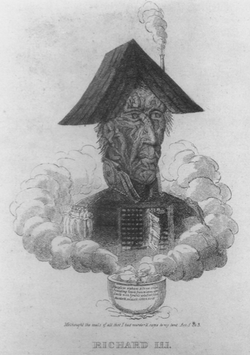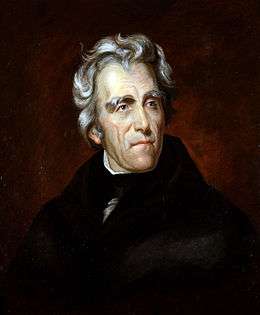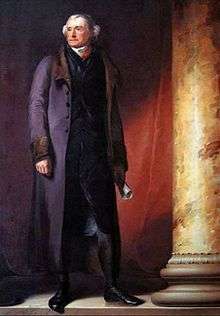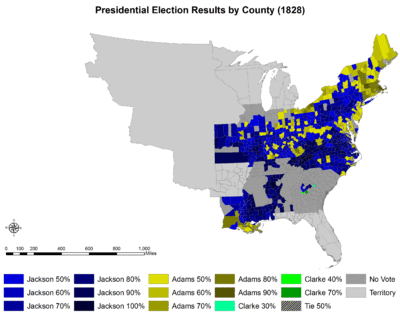Andrew Jackson presidential campaign, 1828
Portions of this article are taken from the US presidential election, 1828 page.
| Andrew Jackson for President | |
|---|---|
 | |
| Campaign | U.S. presidential election, 1828 |
| Candidate |
Maj. Gen. Andrew Jackson U.S. Senator from Tennessee (1797-1798, 1823-1825) John C. Calhoun Vice President of the United States (1825-1832) |
| Affiliation | Democratic Party |
| Status | Won general election |
| Headquarters | Tennessee |
In 1828, Andrew Jackson, who had lost the 1824 election in a runoff in the United States House of Representatives, despite winning both the popular vote and the Electoral vote by significant margins, ran for President of the United States. He had been nominated by the Tennessee state legislature in 1825, and did not face any opposition from Democratic candidates. Jackson launched his campaign on January 8, 1828 with a major speech on the 13th anniversary of the Battle of New Orleans from 1815, thus marking the birth of the modern Democratic Party.[1][2] Jackson accepted John C. Calhoun, incumbent Vice President under John Quincy Adams, as his running mate.[3]
John Quincy Adams was an unpopular President from the beginning of his term, and the Democratic Party, which was just beginning to emerge as a political force, mobilized behind Jackson, a popular war hero who had served in the Battle of New Orleans. Despite his successes as a member of both the House of Representatives and the Senate, as well as the Military Governor of Florida, Jackson had been born in relatively modest surroundings in rural Carolina, which appealed to the majority of Americans, who were small farmers who benefited from the introduction of Universal male suffrage from the 1820s to the 1840s. This expansion of voting rights helped both major political parties (the Democrats and the National Republicans) canvass voters and expand the popular vote.
The campaign was marked by large amounts of nasty "mudslinging." Jackson's marriage, for example, came in for vicious attack. When Jackson married his wife Rachel in 1791, the couple believed that she was divorced, however the divorce was not yet finalized, so he had to remarry her once the legal papers were complete. In the Adams campaign's hands, this became a scandal. Charles Hammond, in his Cincinnati Gazette, asked: "Ought a convicted adulteress and her paramour husband be placed in the highest offices of this free and Christian land?"[4] Jackson also came under heavy attack as a slave trader who bought and sold slaves and moved them about in defiance of modern standards or morality. (He was not attacked for merely owning slaves used in plantation work.)[5] The Coffin Handbills attacked Jackson for his courts-martial, execution of deserters and massacres of Indian villages, and also his habit of dueling.
Background
Election of 1824
The Tennessee legislature nominated Jackson for President in 1822. It also elected him U.S. Senator again. By 1824, the Democratic-Republican Party had become the only functioning national party. Its Presidential candidates had been chosen by an informal Congressional nominating caucus, but this had become unpopular. In 1824, most of the Democratic-Republicans in Congress boycotted the caucus. Those who attended backed Treasury Secretary William H. Crawford for President and Albert Gallatin for Vice President. A Pennsylvania convention nominated Jackson for President a month later, stating that the irregular caucus ignored the "voice of the people" and was a "vain hope that the American people might be thus deceived into a belief that he [Crawford] was the regular democratic candidate".[6] Gallatin criticized Jackson as "an honest man and the idol of the worshipers of military glory, but from incapacity, military habits, and habitual disregard of laws and constitutional provisions, altogether unfit for the office".[7]
Besides Jackson and Crawford, the Secretary of State John Quincy Adams and House Speaker Henry Clay were also candidates. Jackson received the most popular votes (but not a majority, and four states had no popular ballot). The electoral votes were split four ways, with Jackson having a plurality. Because no candidate received a majority, the election was decided by the House of Representatives, which chose Adams. Jackson supporters denounced this result as a "corrupt bargain" because Clay gave his state's support to Adams, who subsequently appointed Clay as Secretary of State. As none of Kentucky's electors had initially voted for Adams, and Jackson had won the popular vote, some Kentucky politicians criticized Clay for violating the will of the people in return for personal political favors. Jackson's defeat burnished his political credentials, however; many voters believed the "man of the people" had been robbed by the "corrupt aristocrats of the East".
Andrew Jackson won a plurality of electoral votes in the election of 1824, but still lost to John Quincy Adams when the election was deferred to the House of Representatives (by the terms of the Twelfth Amendment to the United States Constitution, a presidential election in which no candidate wins a majority of the electoral vote is decided by the House of Representatives). Henry Clay, unsuccessful candidate and Speaker of the House at the time, despised Jackson, in part due to their fight for Western votes during the election, and he chose to support Adams, which led to Adams being elected president. A few days after the election, Adams named Clay his Secretary of State, a position which at that time often led to the presidency. Jackson and his followers immediately accused Clay and Adams of striking a "corrupt bargain," and they continued to lambast the president until the 1828 election.
Adams Presidency
In a prelude to the presidential election, the Jacksonians bolstered their numbers in Congress in the 1826 Congressional elections; Jackson ally Andrew Stevenson was chosen as the new Speaker of the House of Representatives in 1827 over Adams ally Speaker John W. Taylor.
The Tariff of 1828, also known as the Tariff of Abominations, had been signed into law earlier in the year, increasing tariff rates to above 60%. Though it had narrowly passed in the House, it was unpopular with the Southern states as they imported materials and goods from abroad.[8] Jackson and the Democrats opposed the tariff, and the unpopularity of the bill led to a division of the vote into two main sections: the Northern, minority Adams vote, and the Southern, majority Jackson vote. Jackson also personally appealed to the Western states, and he carried their electoral votes as well.
Democratic Party nomination
Democratic candidate:
-

Andrew Jackson
(Tennessee) former Senator
Within months after the inauguration of John Quincy Adams in 1825, the Tennessee legislature re-nominated Jackson for president, thus setting the stage for a re-match between these two very different politicians three years hence. No nominating caucus was held. Jackson accepted the incumbent Vice-President John C. Calhoun as his running mate. Jackson's supporters called themselves Democrats, thus marking the evolution of Jefferson's Democratic-Republican Party into the modern Democratic Party.[3]
Campaign
Jefferson's opinion
Thomas Jefferson wrote favorably in response to Jackson in December 1823 and extended an invitation to his estate of Monticello: "I recall with pleasure the remembrance of our joint labors while in the Senate together in times of great trial and of hard battling, battles indeed of words, not of blood, as those you have since fought so much for your own glory & that of your country; with the assurance that my attempts continue undiminished, accept that of my great respect & consideration."[9]
Jefferson wrote in dismay at the outcome of the contingent election of 1825 to Congressional caucus nominee William H. Crawford, saying that he had hoped to congratulate Crawford but "events had not been what we had wished."[10]
In the next election, Jackson's and Adams' supporters saw value in establishing the opinion of Jefferson in regards to their respective candidates and against their opposition.[11] Jefferson died on July 4, 1826.
A goal of the pro-Adams press was to depict Jackson as a "mere military chieftain."[11] Edward Coles recounted that Jefferson told him in a conversation in August 1825 that he feared the popular enthusiasm for Jackson: "It has caused me to doubt more than anything that has occurred since our Revolution." Coles used the opinion of Thomas Gilmer to back himself up; Gilmer said Jefferson told him at Monticello before the election of Adams in 1825, "One might as well make a sailor of a cock, or a soldier of a goose, as a President of Andrew Jackson."[11] Daniel Webster, who was also at Monticello at the time, made the same report. Webster recorded that Jefferson told him in December 1824 that Jackson was a dangerous man unfit for the presidency.[12] Historian Sean Wilentz described Webster's account of the meeting as "not wholly reliable."[13] Biographer Robert V. Remini said that Jefferson "had no great love for Jackson."[14]
Controversy
Gilmer accused Coles of misrepresentation, for Jefferson's opinion had changed, Gilmer said. Jefferson's son-in-law, former Virginia Governor Thomas Mann Randolph, Jr., said in 1826 that Jefferson had a "strong repugnance" to Henry Clay.[11] Randolph publicly stated that Jefferson became friendly to Jackson's candidacy as early as the summer of 1825, perhaps because of the "corrupt bargain" charge, and thought of Jackson as "an honest, sincere, clear-headed and strong-minded man; of the soundest political principles" and "the only hope left" to reverse the increasing powers assumed by the federal government.[15] Others said the same thing, but Coles could not believe Jefferson's opinion had changed.[11]

In 1827, Virginia Governor William B. Giles released a letter from Jefferson meant to be kept private to Thomas Ritchie's Richmond Enquirer. It was written after Adams' first annual message to Congress and it contained an attack from Jefferson on the incumbent administration. Giles said Jefferson's alarm was with the usurpation of the rights of the states, not with a "military chieftain."[11] Jefferson wrote, "take together the decisions of the federal court, the doctrines of the President, and the misconstructions of the constitutional compact acted on by the legislature of the federal bench, and it is but too evident, that the three ruling branches of that department are in combination to strip their colleagues, the State authorities, of the powers reserved by them, and to exercise themselves all functions foreign and domestic." Of the Federalists, he continued, "But this opens with a vast accession of strength from their younger recruits, who, having nothing in them of the feelings or principles of '76, now look to a single and splendid government of an aristocracy, founded on banking institutions, and moneyed incorporations under the guise and cloak of their favored branches of manufactures, commerce and navigation, riding and ruling over the plundered ploughman and beggared yeomanry."[16] The Jacksonians and states' rights men heralded its publication; the Adams men felt it a symptom of senility.[11] Giles omitted a prior letter of Jefferson's praise of Adams for his role in the embargo of 1808. Thomas Jefferson Randolph soon collected and published Jefferson's correspondence.
Results

The selection of electors began on October 31 with elections in Ohio and Pennsylvania and ended on November 13 with elections in North Carolina. The Electoral College met on December 3. Adams won almost exactly the same states that his father had won in the election of 1800: the New England states, New Jersey, and Delaware. In addition, Adams picked up Maryland. Jackson won everything else, which resulted in a landslide victory for him.
Popular and electoral vote
| Presidential candidate | Party | Home state | Popular vote(a) | Electoral vote |
Running mate | |||
|---|---|---|---|---|---|---|---|---|
| Count | Pct | Vice-presidential candidate | Home state | Elect. vote | ||||
| Andrew Jackson | Democratic | Tennessee | 642,553 | 56.0% | 178 | John Caldwell Calhoun (Incumbent) | South Carolina | 171 |
| William Smith | South Carolina | 7 | ||||||
| John Quincy Adams (Incumbent) | National Republican | Massachusetts | 500,897 | 43.6% | 83 | Richard Rush | Pennsylvania | 83 |
| Other | 4,568 | 0.4% | — | Other | — | |||
| Total | 1,148,018 | 100% | 261 | 261 | ||||
| Needed to win | 131 | 131 | ||||||
Source (Popular Vote): Leip, David. "1828 Presidential Election Results". Dave Leip's Atlas of U.S. Presidential Elections. Retrieved July 27, 2005. Source (Electoral Vote): "Electoral College Box Scores 1789–1996". National Archives and Records Administration. Retrieved July 31, 2005.
(a) The popular vote figures exclude Delaware and South Carolina. In both of these states, the Electors were chosen by the state legislatures rather than by popular vote.
Aftermath
Rachel Jackson had been having chest pains throughout the campaign, and she became aggravated by the personal attacks on her marriage. She became ill and died on December 22, 1828. Jackson accused the Adams campaign, and Henry Clay even more so, of causing her death, saying, "I can and do forgive all my enemies. But those vile wretches who have slandered her must look to God for mercy."[4]
When the results of the election were announced, a mob entered the White House, damaging the furniture and lights. Adams escaped through the back and large punch bowls were set up to lure the crowd outside. Conservatives were horrified at this event, and held it up as a portent of terrible things to come from the first Democratic president.[17]
Andrew Jackson was sworn in as president on March 4, 1829.
References
- ↑ "www.galegroup.com/pdf/whitepapers/gdc/Elections_whtppr.pdf" (PDF). Gale Group. Retrieved 2016-07-06.
- ↑ "The Election of 1828 and the Character Issue". Boundless. Retrieved 2016-07-06.
- 1 2 The Complete Book of U.S. Presidents
- 1 2 McClelland, Mac (October 31, 2008). "Ten Most Awesome Presidential Mudslinging Moves Ever". Mother Jones. Retrieved April 10, 2014.
- ↑ Mark Cheathem, "Frontiersman or Southern Gentleman? Newspaper Coverage of Andrew Jackson during the 1828 Presidential Campaign," The Readex Report (2014) 9#3 online
- ↑ Rutland, Robert Allen (1995). The Democrats: From Jefferson to Clinton. University of Missouri Press. pp. 48–49. ISBN 0-8262-1034-1.
- ↑ Adams, Henry. The Life of Albert Gallatin (1879), 599.
- ↑ The Causes of the Civil War. 3rd ed. New York: Touchstone, 1991
- ↑ Thomas Jefferson to Andrew Jackson, December 18, 1823 Retrieved on November 21, 2006.
- ↑ Thomas Jefferson to William H. Crawford, February 15, 1825. Retrieved on November 21, 2006.Transcript.
- 1 2 3 4 5 6 7 Peterson, Merrill D.. The Jefferson Image in the American Mind, p. 25-27
- ↑ Webster, Daniel (1857). Webster, Fletcher (ed.), ed. The Private Correspondence of Daniel Webster. Boston: Little, Brown and Company. p. 371.
- ↑ Wilentz, Sean. Andrew Jackson (2005), p. 8.
- ↑ Remini, Jackson 1:109
- ↑ Peterson, Merrill D.. The Jefferson Image in the American Mind, p. 26. See also: Andrew Stevenson's Eulogy of Andrew Jackson: B. M. Dusenbery (ed.), ed. (1846). Monument to the Memory of General Andrew Jackson. Philadelphia: Walker & Gillis. pp. 250, 263–264.
- ↑ Thomas Jefferson to William Branch Giles, Dec. 26, 1825. Peterson characterized this letter as "one of the most influential that Jefferson ever wrote."
- ↑ See The Limits of Liberty, American History, 1607-1992, Second Edition, Maldwyn A. Jones, Oxford University Press, p(139)